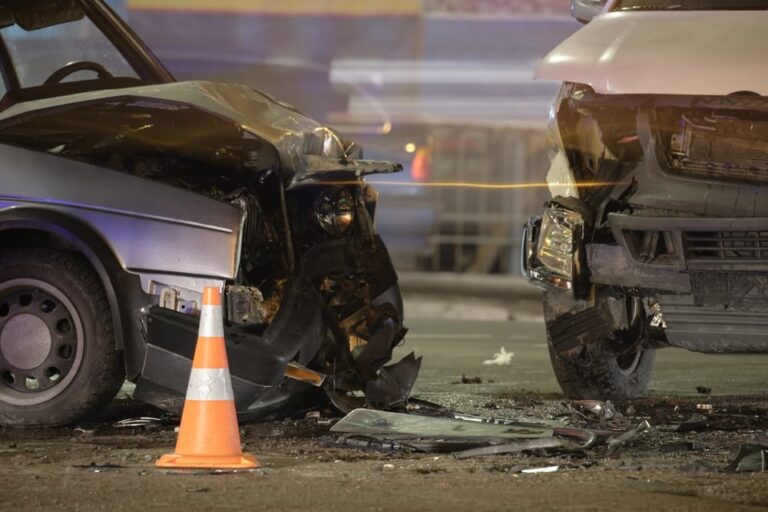Some genius decided to treat a stop sign like a vague suggestion and plowed into your car. Or maybe they were perfecting their latest TikTok dance instead of watching the road. Whatever happened, it wasn’t your fault. Not even close.
Yet, here you are, staring at your slightly-less-pristine vehicle (or worse), wondering about the annoying next steps. A nagging question pops into your head: “Do I really need to call my insurance company if the accident wasn’t my fault?”
It feels backward, right? Like telling on yourself for something someone else did. The short answer, though, is generally yes, you should notify your own insurance company. It might seem counterintuitive, but making that call car accident lawyer can actually protect you.
Dealing with the aftermath of an accident is stressful enough without adding insurance company runarounds. If someone else’s carelessness caused your accident in Illinois, you don’t have to handle it alone.
Give the team at Walner Law a call at (312) 410-8496. We will clarify your next steps.
Let’s Talk About That Rate Hike Fear

The number one reason people hesitate to call their own insurance after a not-at-fault accident is the fear of skyrocketing premiums. You picture your rates launching into orbit just because you were in the wrong place when another driver messed up.
This fear isn’t entirely baseless. Some insurance companies might raise rates after any reported incident, even if you weren’t liable. Some might see multiple claims, even not-at-fault ones over time, as a sign of increased risk. Insurance companies use complex calculations, and sometimes being involved in any accident, regardless of fault, can nudge your risk profile in their eyes.
However, in the vast majority of cases, particularly in a fault-based state like Illinois, your rates should not increase solely because someone else hit you and you filed a claim related to their liability. Filing a claim against the other driver’s policy (a third-party claim) or even using certain coverages on your own policy (like Uninsured Motorist coverage or MedPay) after a not-at-fault accident generally doesn’t trigger the same rate hikes as an at-fault claim does. Some insurers even offer “accident forgiveness” for the first incident, although the terms vary.
The reality is, not reporting the accident could lead to bigger headaches than a potential small rate adjustment down the line.
Your Policy: More Than Just a Piece of Paper You Overpay For
Think of your insurance policy as a contract. You pay premiums, and the insurance company agrees to provide certain coverages under specific conditions. One of those conditions, almost universally included in the fine print, is a duty to promptly notify the insurer of any accident or incident that could potentially lead to a claim.
Why do they care if it wasn’t your fault?
- It’s part of the deal: You agreed to keep them informed. Failing to do so could technically be a breach of your contract.
- Future problems: What if the seemingly nice driver who admitted fault at the scene suddenly develops amnesia and tells their insurance company you caused the accident? What if their insurance turns out to be lapsed or non-existent? If you haven’t notified your insurer, you might face difficulties using your own coverage later if these issues pop up. Trying to report it weeks or months later gives the insurer grounds to question the situation or even deny coverage you might desperately need.
Think of reporting it as checking a box – fulfilling your end of the bargain to keep your coverage options open, just in case.
Why Calling Your Insurance Is Actually a Smart Move (Even When You Did Nothing Wrong)
Beyond fulfilling your contractual duty and calming the rate-hike boogeyman, there are solid, practical reasons to loop your insurer in after someone else causes a wreck.
They Can Run Interference (Sometimes)
While the main claim is against the at-fault driver’s insurance, your insurance company can sometimes offer guidance or even help facilitate communication. They deal with other insurers constantly and know the process. This isn’t always the case, but having them aware of the situation from the start can be beneficial.
Accessing Your Own Hard-Earned Coverage
This is a big one. Your policy isn’t just about liability if you mess up; it often includes coverage designed to help you out, regardless of fault, or when the other driver falls short.
- Medical Payments (MedPay) Coverage: Illinois doesn’t mandate PIP (Personal Injury Protection) like some states, but MedPay coverage is a common, optional addition to auto policies here. MedPay helps cover your medical bills (and often your passengers’) up to your policy limit, regardless of who was at fault. This is huge. It pays quickly, often without deductibles, helping you cover ER visits, doctor appointments, or chiropractic care while you wait for the lengthy process of getting the other driver’s insurance to pay up. Using MedPay lets you get treatment without delay. (Note: If you later recover money from the at-fault driver, your insurer might seek reimbursement for MedPay funds, but getting bills paid promptly is often worth it).
- Uninsured/Underinsured Motorist (UM/UIM) Coverage: This is critical protection. Illinois law (625 ILCS 5/7-601) mandates that all drivers carry liability insurance. The state also requires insurers to include UM coverage matching these minimum bodily injury limits to protect you if the at-fault driver has no insurance or flees the scene (hit-and-run). Insurers must also offer UIM coverage (which you can reject in writing), which helps cover the gap if the at-fault driver has insurance, but their policy limits aren’t high enough to cover all your damages – a common scenario with serious injuries. You cannot use this coverage if you haven’t reported the accident to your insurer.
- Collision Coverage: Let’s say the other driver’s insurance is dragging their feet on approving repairs, but you need your car now. If you have collision coverage on your policy, you can choose to file a claim with your own insurer to get your car fixed faster. You’ll pay your deductible upfront, but your insurance company will then typically pursue the at-fault driver’s insurer to get reimbursed (a process called subrogation), including recovering your deductible for you. Reporting the accident promptly makes this process smoother.
Fighting About Fault (Because People Change Their Stories)
Illinois operates under a “modified comparative negligence” rule (735 ILCS 5/2-1116). This means if you are found partially responsible for the accident, your ability to recover damages is affected. Specifically:
- If you are found more than 50% at fault, you cannot recover any damages from the other party.
- If you are found 50% or less at fault, you can recover damages, but your compensation will be reduced by your percentage of fault. (e.g., if you have $100,000 in damages but are found 20% at fault, you can only recover $80,000).
The other driver, or their insurance company, might try to argue you were partially to blame to reduce their payout. Reporting the accident to your insurer immediately establishes your version of events early on. If a dispute arises, your insurer has the information needed to help defend your position and argue against unfair allocations of fault.
Making the Call: What to Say (and Not Say)
Okay, you’re convinced. You’re going to call your insurance company. What now?
- Have Your Info Ready: Policy number, date/time/location of the accident, names and insurance info of other drivers involved (if you have it), police report number (if applicable), and a basic description of what happened and the damage.
- Stick to the Facts: Report what happened, not what you think happened or why it happened. Avoid speculation, guessing speeds, or emotional language. “The other car failed to yield and struck my vehicle on the driver’s side” is better than “That idiot blew the stop sign because he was probably drunk and texting!”
- Do NOT Admit Fault (Even Accidentally): Be careful with phrasing. Avoid saying things like “I should have seen him coming” or “Maybe I could have stopped faster.” Even polite apologies can sometimes be twisted later. Just state the objective facts.
- Clarify: Reporting vs. Claiming: Be clear whether you are just notifying them of the incident (as required by your policy and to keep options open) or if you intend to file a specific claim under your own coverage (like MedPay or Collision).
- Expect Follow-Up: An adjuster will likely contact you. Again, stick to the facts. Be truthful, but cautious. Remember, even your adjuster works for the insurance company.
Dealing with the Other Guy’s Insurance: Prepare for Battle
While notifying your insurer is wise, the primary responsibility for paying damages rests with the at-fault driver’s insurance company. You’ll likely need to file a “third-party claim” directly with them. Brace yourself.
- Their Goal is NOT Your Happiness: The adjuster for the other driver’s insurance company works for them. Their job is to minimize the amount the company pays out. They are not your friend.
- Common Tactics: Expect potential delays, requests for recorded statements (be very wary of giving these without legal advice), lowball settlement offers, and attempts to shift some blame onto you (remember that comparative negligence rule?).
- Why Legal Help Matters Here: This is where having an attorney is incredibly helpful. We understand insurance company tactics. We know how to value your claim accurately (including property damage, medical bills, lost wages, pain and suffering). We handle the negotiations and fight back against unfair lowball offers or attempts to assign fault incorrectly. We also ensure everything is filed correctly and within Illinois’s deadlines – the statute of limitations is generally two years from the accident date for personal injury claims (735 ILCS 5/13-202) and five years for property damage claims (735 ILCS 5/13-205). Miss these deadlines, and you lose your right to sue for compensation.
When the At-Fault Driver is Uninsured or Underinsured

We touched on this earlier, but it deserves expanding on because it highlights a major reason for reporting to your own insurer. If the driver who hit you has no insurance (violating Illinois law 625 ILCS 5/7-601) or inadequate limits to cover your damages, your own Uninsured Motorist (UM) or Underinsured Motorist (UIM) coverage becomes your lifeline.
- UM Claim: If the other driver is uninsured or can’t be identified (hit-and-run), you file a claim against the UM portion of your policy. Your insurance company essentially steps into the shoes of the missing/uninsured driver’s insurer.
- UIM Claim: If the other driver has insurance, but their bodily injury liability limits aren’t enough to cover your medical bills and other injury-related losses, you can file a UIM claim under your own policy to cover the difference, up to your UIM policy limits.
In both scenarios, you are making a claim against your own insurance company. While it feels strange, this is precisely what this coverage is for. However, even dealing with your own company on a UM/UIM claim can become adversarial, as they may still try to minimize the payout. Reporting the accident promptly is the first step to accessing this coverage.
Secure Your Recovery with Walner Law
Don’t face the insurance companies alone. The personal injury attorney at Walner Law is ready to handle the complexities of your claim, fight for fair compensation, and let you focus on recovery.
Call us today at (312) 410-8496 for a free consultation.


 Skip to content
Skip to content




